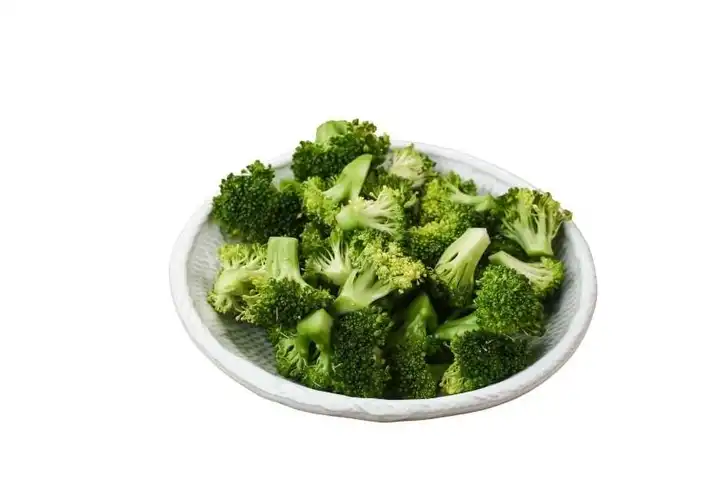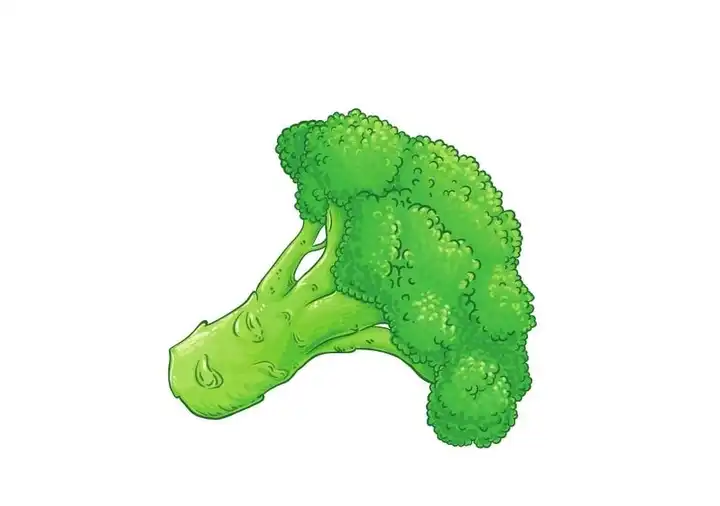One question often baffles puppy owners in the complex realm of canine nutrition: Can puppies eat Broccoli? This piece aims to provide a comprehensive and scientific answer to this important query.
Can puppies eat Broccoli?
Yes, puppies can eat Broccoli in moderation as part of a balanced diet. However, it should not make up more than 10% of their daily intake due to its high fiber content and the presence of a compound called isothiocyanate. Always consult your vet before introducing new foods into your puppy’s diet.

The Vitamins and Minerals Packed in Broccoli
Broccoli is a treasure trove of essential vitamins and minerals contributing to overall health and vitality. According to Dr. Jennifer Coates, a vet advisor for PetMD, Broccoli is rich in vitamins K and C, both of which are vital for your puppy’s health.
Vitamin K plays a critical role in bone health and blood clotting. This makes it especially important for growing puppies to build their bone density and need adequate blood clotting capabilities for minor injuries during their playful antics.
Meanwhile, Vitamin C is a powerful antioxidant that helps protect your puppy’s cells from damage and supports their immune system, making them more resistant to various diseases. While dogs, unlike humans, can produce their Vitamin C, additional sources in their diet can be beneficial, particularly during periods of stress or illness.
Besides these, Broccoli contains other essential minerals like calcium, potassium, and magnesium. Calcium is integral for strong bones and teeth, especially in rapidly growing puppies, while potassium supports heart health and muscular function. Magnesium plays a part in various biological functions, including protein synthesis, muscle and nerve function, and maintenance of heart rhythm.
Given this, it’s clear that Broccoli has a wealth of nutritional benefits to offer. However, it’s worth noting that these vitamins and minerals supplement a puppy’s diet and should not replace a balanced dog food that caters specifically to a puppy’s nutritional needs. As the American Kennel Club suggests, while adding a bit of steamed Broccoli to your dog’s diet is healthy, it should not constitute more than 10 percent of the dog’s daily food intake.
Always consult your veterinarian or a pet nutrition expert before significantly changing your puppy’s diet to ensure they receive balanced and complete nutrition.
Broccoli’s Rich Fiber Content: What Does It Mean for Your Puppy?
Dr. Klein, a veterinary expert at the American Kennel Club, explains that fiber is a distinct type of carbohydrate. Unlike other carbs, it isn’t fully digested by your dog’s system. Instead, it moves relatively untouched through your puppy’s stomach and small intestine to the colon, serving various essential functions.
The Role of Fiber in Healthy Bowel Movements
One of the primary benefits of dietary fiber is its ability to support healthy bowel movements. Fiber absorbs water in the colon and adds bulk to your puppy’s stools. This process can help prevent constipation and promote regular bowel movements.
Fiber as a Prebiotic: Nourishing Gut Bacteria
Additionally, fiber can act as a prebiotic, nourishing the beneficial bacteria in your puppy’s gut. These bacteria are crucial in digestion and overall gut health. Furthermore, their well-being can impact your puppy’s health, including the immune system.
Dietary Fiber and Weight Management
In addition to aiding digestion, dietary fiber also contributes to weight management. By providing a sense of fullness, fiber can help prevent overeating—a crucial benefit for puppies prone to rapid weight gain. Consequently, a diet high in fiber can contribute to maintaining a healthy weight as your puppy grows.
Moderation is Key: The Risks of Excessive Fiber
It’s important to note that while a moderate amount of fiber can be beneficial, excessive intake can lead to digestive upset, including diarrhea or bloating. This is another reason why Broccoli, although a healthy treat, should only constitute a small portion of your puppy’s diet.
Consult with a Veterinarian Before Introducing New Foods
Lastly, before introducing Broccoli or any new food into your puppy’s diet, it’s essential to consult with your veterinarian. This consultation will ensure that it’s a suitable choice for your puppy, considering its age, size, breed, and overall health status.
The Potential Health Benefits of Feeding Broccoli to Puppies

Broccoli can provide several health benefits to puppies when properly prepared and in moderation.
Rich in Essential Vitamins and Minerals
It is packed with vitamins C, K, A, and B vitamins. Additionally, it contains minerals like potassium, calcium, and iron. These vitamins and minerals donate to your puppy’s health, including bone health, immune function, and blood cell function.
Good Source of Fiber
It is a good dietary fiber source, aiding digestion and promoting gut health. Fiber contributes to feelings of fullness, which can allow control over overconsumption and weight gain in puppies.
Antioxidant Properties
It is rich in antioxidants, such as vitamin C and flavonoids, which can help save your puppy’s cells from injury by free radicals. This can donate to prevailing health and potentially help prevent certain diseases.
Promotes Eye Health
It contains beta-carotene, a vitamin A precursor essential for supporting eye health. Vitamin A helps protect the eye’s surface (cornea) and is essential for good vision.
Supports Skin Health
it can donate to healthy skin and a shiny coat. Vitamin C plays a vital function in collagen production, which supports skin health, while vitamin A helps to regulate skin cell growth.
Despite these potential benefits, remember that all puppies are individuals. What works well for one might not work for another.
Possible Risks of Feeding Broccoli to Puppies

While Broccoli is generally considered secure for puppies, it has potential risks. When introduced into a puppy’s diet, any new food should be given in restraint to observe for negative responses.
Choking Hazard
One of the primary risks is the possible choking hazard. Broccoli stems, and florets can be difficult and pose a choking risk if improperly prepared.
Digestive Upset
Overfeeding can lead to digestive upset in puppies. This is due to the high fiber in Broccoli, which, when ingested in large amounts, can drive gas, bloating, and even runs. Always stick to small, controlled portions when introducing Broccoli into your puppy’s diet.
Isothiocyanate Toxicity
Broccoli contains a naturally occurring compound named isothiocyanate, which can generate mild to extreme gastric disturbance in dogs if ingested in large amounts. While it’s unlikely your puppy would consume enough Broccoli for this to be a major concern, it’s still important to remember.
Allergic Reactions
Although rare, puppies can be allergic to Broccoli. You must seek veterinary care if you see signs such as itching, swelling, difficulty breathing, or any other pain symptoms after providing your puppy broccoli.
Nutrient Imbalance
It is packed with nutrients and should always supplement a balanced, complete dog food diet. Overfeeding could guide to a nutrient imbalance, potentially causing deficiencies in crucial nutrients like protein and fat that puppies need for healthy growth.
A Deep Dive into Puppy Nutrition
Understanding the fundamentals of puppy nutrition is vital for any pet owner striving to ensure their young puppy’s healthy development and expansion. Unlike adult dogs, they have special dietary needs due to their quick development and energetic lifestyle.
Understanding the Dietary Needs of Growing Puppies
Puppies are known for their boundless energy and rapid growth. This results in them needing more calories than grown-up dogs. Energy in their diet mainly comes from three nutrient groups: proteins, fats, and carbohydrates.
- Protein: The Building Blocks: Proteins are pivotal in a puppy’s diet as building muscle development blocks. Moreover, protein aids in repairing cells, producing hormones, and helping the immune. The (AAFCO) suggests that dry food for puppies contains a minimum of 22.5% protein.
- Fats: For Energy and Essential Functions: Fats provide the most concentrated energy source in a puppy’s diet, delivering more than twice the energy of proteins or carbohydrates. They also play an essential role in brain development, absorption of fat-soluble vitamins (A, D, E, K), and maintaining healthy skin and a shiny coat. The AAFCO recommends that dry food for puppies contain at least 8.5% fat.
- Carbohydrates: For Immediate Energy and Fiber: Carbohydrates, including fiber, are the third key group of nutrients. While not explicitly required in a canine diet, they provide immediate energy and can contribute to gastrointestinal health, particularly dietary fiber.
- Micronutrients: Vitamins and Minerals: Beyond these macronutrients, puppies also need an array of vitamins and minerals for their overall growth and development. These include calcium and phosphorus for bone development, iron for blood cell function, and various B vitamins for enzyme function.
- Hydration: An Essential Aspect of Nutrition: Remember to consider the importance of clean, fresh water for your puppy. Proper hydration supports all aspects of their health and aids digestion and nutrient absorption.
- The Importance of a Balanced Diet: Remembering that a balanced diet is more important than focusing on personal nutrients is crucial. Feeding commercially prepared puppy food provides all the nutrients that your developing puppy requires in the right ratios.
The Role of Vegetables in a Puppy’s Diet
Vegetables play a supportive but significant role in a puppy’s diet. Although puppies are primarily carnivorous and require a diet rich in animal protein, they can still benefit from the nutrients provided by vegetables. That said, vegetables should complement, not replace, the core elements of a puppy’s diet.
- Nutrient-Rich Addition: Vegetables are rich in various vitamins, minerals, and fiber, which can support your puppy’s overall health. They can supply vital nutrients valuable for a puppy’s development, such as vitamins A, C, and K, along with calcium, potassium, and other minerals.
- Digestive Health Support: It are usually high in fiber, helping digestion and boosting gut health. Fiber contributes to feelings of fullness, which can allow control of overfeeding and help weight control. It can also assist in keeping your puppy’s bowel motions every day.
- Antioxidant Benefits: Many vegetables, including Broccoli, are high in antioxidants. These compounds help combat oxidative stress in your puppy’s body and improve overall well-being and disease prevention.
- Dental Health: Crunchy vegetables can also play a role in dental health. Chewing raw, firm vegetables can help clean your puppy’s teeth, reducing plaque buildup.
The Safety Factor: Is Broccoli Good for Puppies?
Broccoli and Puppies: A Match Made in Heaven or a Recipe for Disaster?
Broccoli’s nutrient-rich profile can be a healthful addition to a puppy’s diet. However, like any food, it must be served in restraint and prepared perfectly.
The Verdict from Veterinary Science
Most veterinarians concur that Broccoli is safe for puppies when given in controlled portions and correctly prepared.
Inside the Puppy Digestive System: How Well Can Puppies Digest Broccoli?
A puppy’s digestive system is still developing, making certain foods harder to digest than others.
The Dynamics of a Puppy’s Developing Digestive System
With their developing digestive systems, puppies may struggle to digest raw vegetables, including Broccoli. This is why preparation methods matter.
Why Gradual Introduction of New Foods is Crucial
gradually introduced, a puppy’s digestive system adjusts, reducing the risk of digestive upset.
Portion Control: How Much Broccoli is Too Much for Puppies?
While Broccoli can be beneficial, portion control is critical.
Figuring Out the Right Portion Size
It is at most 10% of a puppy’s daily caloric intake. Too much can guide to digestive upset.
The Ten Percent Rule in Canine Nutrition
The 10% rule suggests that treats, snacks, and supplemental foods like vegetables should make up no more than 10% of a pet’s daily caloric intake.
Raw vs. Cooked: What’s the Best Way to Serve Broccoli to Puppies?
Both raw and cooked forms have benefits and drawbacks when serving Broccoli to puppies. The decision on which is best for your puppy comes down to their digestion, preference, and the advice of your veterinarian.
Raw Broccoli
It is rich in nutrients, as some vitamins can diminish during cooking. Raw broccoli florets can be a crunchy treat that many puppies might enjoy, and they can also help with teeth cleaning. However, there are some considerations to keep in mind.
It can be harder for some puppies to digest, potentially leading to gas or bloating. Moreover, raw broccoli stems can be a choking hazard, especially for small puppies. If you decide to serve raw Broccoli, it’s recommended to cut it into tiny, bite-sized pieces and observe your puppy while eating.
Cooked Broccoli
It is often easier for puppies to chew and digest, reducing the risk of choking and digestive upset. Steamed or boiled Broccoli (without added salt, butter, or seasonings) can be a safe and nutritious choice.
Cooking can diminish some of the vitamins in Broccoli, but it can also make others more bioavailable. For example, the process can break down the cell walls, making the nutrients easier for your puppy to absorb.
However, avoid serving puppies Broccoli cooked with garlic, onions, or certain spices, as these can harm puppies. Confirm the Broccoli is cooled before doing it to your puppy to prevent burns.
Smart Preparation Tips for Serving Broccoli to Puppies

When preparing or cooking Broccoli for puppies, following certain guidelines is important to ensure their safety and well-being. Here’s how Broccoli should be prepared or cooked for puppies:
- Steaming or Boiling: Steaming or boiling Broccoli is generally considered the best cooking method for puppies. These methods help retain the nutrients while completing the Broccoli more comfortable to chew and digest for puppies.
- Avoid Harmful Additives or Seasonings: It is crucial to avoid adding any harmful additives or herbs to the Broccoli when boiling for puppies. Common ingredients like salt, butter, oils, or spices should be omitted, as they can harm puppies.
- Use Fresh and Organic Broccoli: opt for fresh and organic Broccoli whenever possible. This helps minimize the risk of pesticide residues and contaminants that may be present in conventionally grown produce. Washing the Broccoli thoroughly before cooking is also recommended.
- Cut into Bite-sized Pieces: Before serving the cooked Broccoli to puppies, cut it into tiny, bite-sized portions. This makes it easier for puppies to chew and minimizes the risk of choking.
Beyond Broccoli: Other Vegetable Alternatives for Puppies
While Broccoli is a healthy choice, other vegetable puppies can safely enjoy it.
Safe and Nutritious Vegetable Puppies Can Enjoy
Carrots, green beans, cucumbers, and sweet potatoes are among the other safe and nutritious vegetables you can include in your puppy’s diet.
Why Variety is Essential in a Puppy’s Diet
Just like humans, puppies benefit from a varied diet. Different vegetables provide different nutrients, promoting a more balanced nutrition profile.
Identifying Broccoli Intolerance in Puppies
Though rare, some puppies may show intolerance to Broccoli, manifesting as digestive upset.
Common Symptoms of Broccoli Intolerance
Symptoms can include vomiting, diarrhea, or decreased appetite following broccoli consumption. It’s best to stop it and consult your vet if such symptoms appear.
Immediate Steps to Take if Your Puppy Shows Adverse Reactions
If your puppy shows any adverse reactions to Broccoli, stop feeding it immediately, provide plenty of water, and observe them near. If symptoms persist, seek veterinary advice.
Emergency Situations: When to Call the Vet
While most broccoli-related issues are minor, there are times when you should seek immediate veterinary help.
Recognizing Serious Broccoli-Related Health Issues
If your puppy shows severe symptoms like continuous vomiting, blood in stool, lethargy, or difficulty breathing after consuming Broccoli, seek immediate veterinary attention.
The Importance of Prompt Veterinary Intervention
Early veterinary intervention can prevent minor health issues from escalating and ensure your puppy’s well-being.
Myths and Misunderstandings: Clearing the Air About Puppies and Broccoli
Misinformation often surrounds the topic of puppies and Broccoli.
Common Misconceptions About Broccoli in a Puppy’s Diet
From beliefs that Broccoli is outright toxic to dogs to misconceptions about how much a puppy can safely consume, numerous myths need debunking.
Why Facts Trump Fear: Relying on Science, Not Scare Tactics
It’s essential to rely on scientific evidence and professional advice when deciding what to include in your puppy’s diet rather than succumbing to fear or misinformation.
Comparing Puppies and Adult Dogs: Does Age Affect Broccoli Consumption?

Age and size play a role in determining the suitability and quantity of Broccoli in a dog’s diet.
The Nutritional Differences Between Puppies and Adult Dogs
Puppies have different nutritional needs than adult dogs, which can influence how much and how often they should consume supplemental foods like Broccoli.
Adjusting Broccoli Serving Sizes as Your Puppy Grows
As your puppy grows into an adult dog, their caloric needs and, thus, its Broccoli serving size may change.
Conclusion
Can puppies eat Broccoli – Puppies can indeed eat Broccoli as part of a balanced diet. It offers several potential health benefits, including being a rich source of essential vitamins and minerals, promoting digestive health, providing antioxidants, supporting eye and skin health, and contributing to overall well-being.
However, it is crucial to remember that Broccoli should only make up a small portion of a puppy’s diet, no more than 10% of their daily intake. Always consult your veterinarian before introducing new foods into your puppy’s diet.
While Broccoli is generally safe for puppies, some risks should be considered. Improperly prepared Broccoli can pose a choking hazard, and excessive consumption may lead to digestive upset or isothiocyanate toxicity. It’s also possible for puppies to be allergic to Broccoli. Broccoli should not replace a balanced dog food diet, as it could lead to nutrient imbalances.
When feeding Broccoli to puppies, portion control is essential, and it can be served either raw or cooked, depending on your puppy’s digestion and preference. However, it’s crucial to introduce new foods gradually and observe your puppy for any adverse reactions. Always consult your veterinarian for personalized advice on your puppy’s diet and nutrition.
Remember, while Broccoli can be a healthy addition to your puppy’s diet, it should be part of a varied and balanced nutritional plan. By understanding the facts, risks, and proper feeding guidelines, you can make informed decisions to ensure your puppy’s overall health and well-being.



